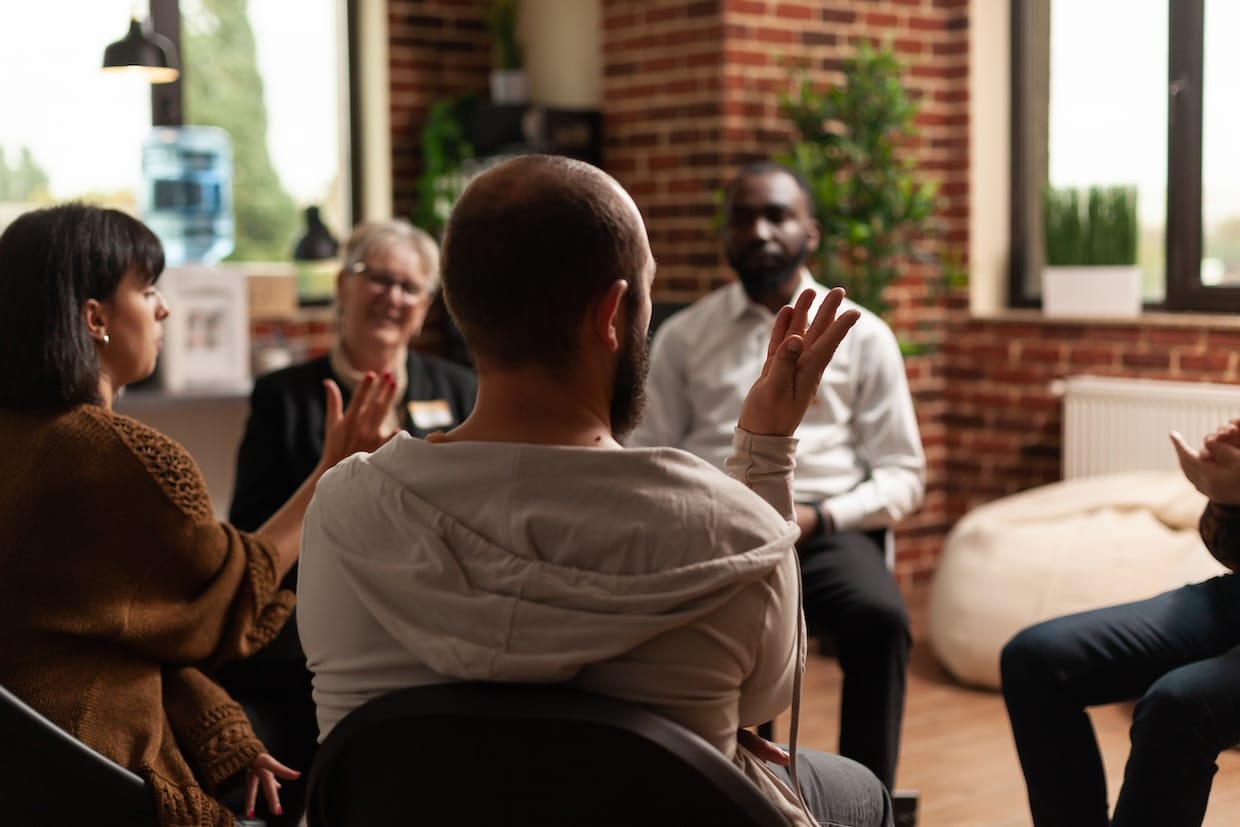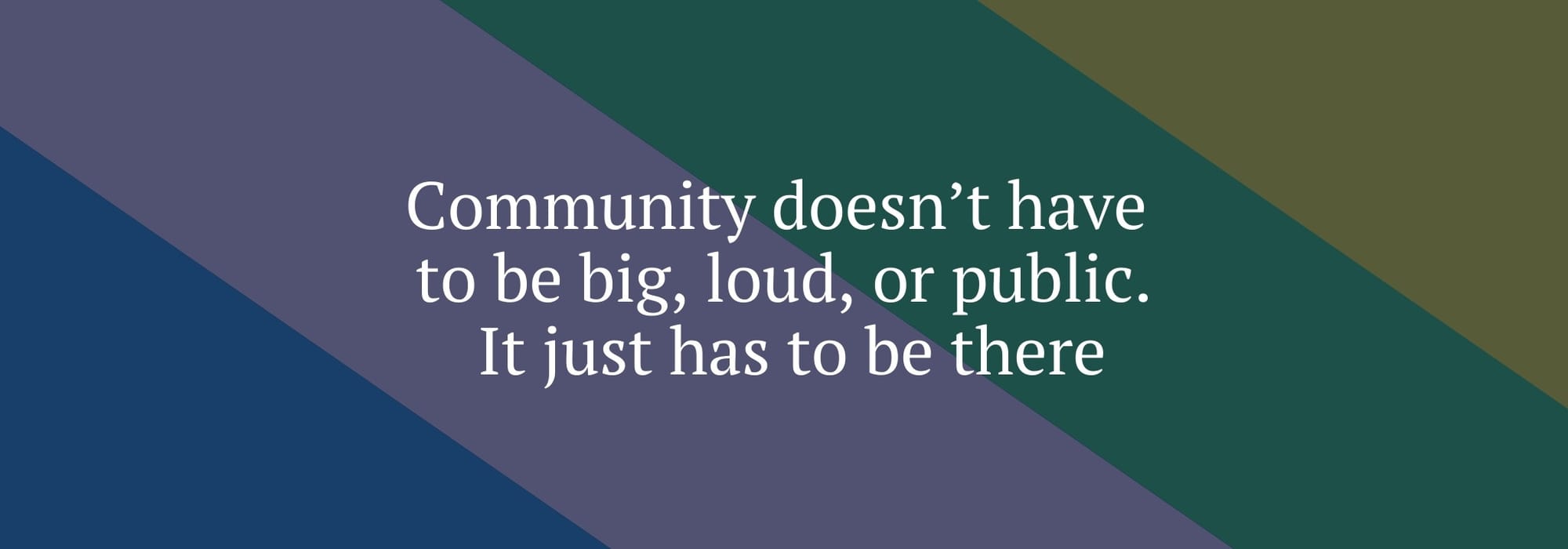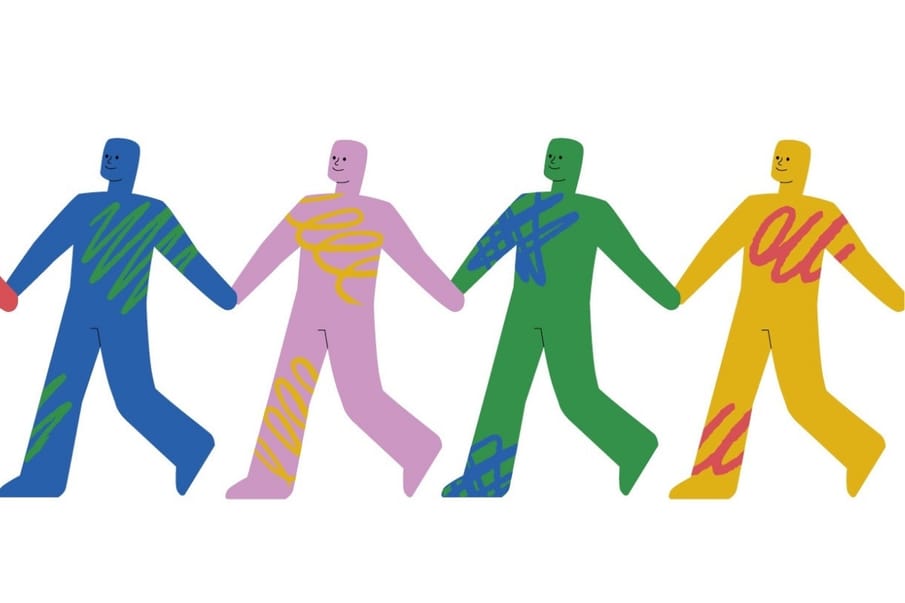Whether you’re curious about Alcoholics Anonymous, or want to understand your options on a sobriety journey, the value of group connections shouldn’t be underestimated
A community hall, chairs arranged in a circle, lukewarm coffee and biscuits at the side – when you think of support groups, this is probably the image that springs to mind. Presented in countless TV shows and films, Alcoholics Anonymous (AA) is undoubtedly the most well-known, but what is it actually like to attend a support group? Do they really help? And, is it right for you?
Perhaps you’re sober, or sober curious. Maybe you’ve been thinking about cutting back on drinking for a while, or you’ve had that one moment where you realised alcohol was doing way more harm than good. That was me, three years ago, waking up in the doorway of a bookmakers after another blackout. I’d struggled with anxiety and depression for several years and alcohol wasn’t helping – it was pouring petrol on the fire. That moment was my rock bottom. And I knew something had to change.
Since then, I’ve been on a mission to build a life I don’t want to escape from – one that’s hangover-free, anxiety-light, and full of community. Through my podcast, ‘The Stress Sessions’, and connecting with others in person and online, I’ve realised just how powerful shared experiences are. That’s exactly what support groups like AA are built on.
What even is AA?
AA is a peer-led community of people who want to stop drinking, and support each other while doing so. It’s been around since the 1930s, and follows a 12-step programme to help people stay sober, one day at a time. There are 4,600+ weekly meetings across the UK, with more than four million annual attendances. That’s a lot of people walking through the same doors, looking for the same kind of support – and finding it.
It’s free, open to anyone who might have a problem with alcohol, and completely anonymous. You don’t need a referral, you don’t have to sign up for anything, and you don’t even have to say a word if you don’t want to.
“But isn’t AA really formal… and a bit culty?”
Honestly, before I started researching AA, that’s what I thought too. I imagined a big, cold hall with fluorescent lighting and awkward silences. In reality, it’s nothing like that. People show up, share their stories (if they want to), and support each other. Some meetings are even in coffee shops, community centres, or online. There’s no pressure. And absolutely no judgement.

You’ve probably also heard that AA is pretty religious. And yes, it does talk about a “higher power”, but it doesn’t have to be about God unless you want it to be. For some, that higher power is faith. For others, it’s the group itself, nature, inner strength – or even a cat named Phil. The point is: it’s yours to define based on what supports your sobriety goals.
What actually happens at a meeting?
There’s usually a bit of structure: a welcome, some readings, people sharing their experiences, and a closing message. You only use first names – no one’s swapping TikTok handles – so, everything’s completely anonymous. And, if you want to sit quietly and just listen? That’s 100% fine. Loads of people do.
There are open meetings (anyone can go), closed meetings (for those trying to achieve or maintain sobriety), and online options – a game changer for accessibility. The whole thing is built on connection. No one’s there to fix you, but they get you. And sometimes, that means everything.
The power of ‘me too’
AA works because it’s not a lecture or a list of dos and don’ts – it’s people with lived experience, sharing what’s worked for them. And the science backs that up. A 2020 Cochrane Review found that AA and similar 12-step programmes may be more effective when it comes to staying sober long-term – with 42% of participants in AA remaining sober a year later, compared to 35% of those using other treatment methods.
Add to that a 2022 survey from AA UK, where 83% said helping other people, and 81% said the sense of belonging, helped them maintain sobriety, and you can see why people keep going back to meetings. When you feel seen and understood, change becomes a whole lot easier.
Community calling
While AA is perhaps the most well-known support group, it’s not the only option – and the benefits of connecting with others, and having that network beside you, ring true regardless of where you turn to. I can attest to finding huge support through other sober spaces, especially online, so if it doesn’t sound like the right fit for you, there are other places ready to welcome and support you.
Sober Girl Society (SGS) was one of the first communities I came across. Founded by Millie Gooch in 2018, SGS is now the world’s largest sober and sober-curious community for women. What started as an Instagram page is now a global movement – full of meet-ups, events, and non-judgy, relatable content. Millie’s posts, drink recommendations, and honest chats, were a lifeline for me in those early days.
When SGS started hosting mixed-gender events, I finally got to go along. I was nervous, obviously. But within 10 minutes, I was deep in conversation with someone else who had quit drinking for their mental health, and used to use alcohol as a crutch in social situations. That chat was a turning point for me, because it reminded me how good a sober connection can feel.
Someone else who has inspired me online has been mental health advocate Dr Alex George. He’s now been sober for more than two years, and listening to him speak openly about alcohol and anxiety helped me feel less alone. He even launched a men’s mental health app (Mettle) and was appointed the UK Youth Mental Health Ambassador. As role models go, he’s a brilliant one for the sober community.
Finding your people is half the battle
Peer support is the secret sauce of sobriety. It doesn’t matter if it’s through AA, Instagram DMs, or WhatsApp chats at 11pm when you’re tempted to go to the pub. What matters is feeling like you’re not doing this alone.
One of my most solid sober friendships started when I replied to someone’s Instagram post about being six months alcohol-free. We now check-in every week. No pressure, no performance – just honest chat.

And that’s the magic of it. Community doesn’t have to be big, loud, or public. It just has to be there.
If you’re thinking about AA (or sobriety in general)…
Here’s what I’ll say: you don’t need to have lost everything to consider AA, or any other support group. You don’t need to label yourself an alcoholic. If alcohol is controlling your life, your mental health, your energy, or your relationships, you’re allowed to seek support.
Maybe your first step isn’t going to a meeting. Maybe it’s listening to a podcast (mine’s called ‘The Stress Sessions’, if you fancy it), reading someone’s story, or just admitting to yourself that something needs to shift. That’s still a step.
And if you do decide to check out AA, all I ask is that you go there with an open mind. You might just find your community. Alcoholics Anonymous offers free, peer-led support for people who want to stop drinking – with no strings attached. It works for millions because of one simple truth: connection is powerful. Whether it’s AA, Sober Girl Society, or a friend on Instagram who just gets it, community can carry you through the hardest of days.
Sobriety isn’t about restriction – it’s about choice. It’s about waking up fresh, being proud of your decisions, and building a life that works for you.
So, if you’re on the fence, here’s your sign. Try it. Reach out. You’ve got nothing to lose… and a whole lot to gain.


Comments